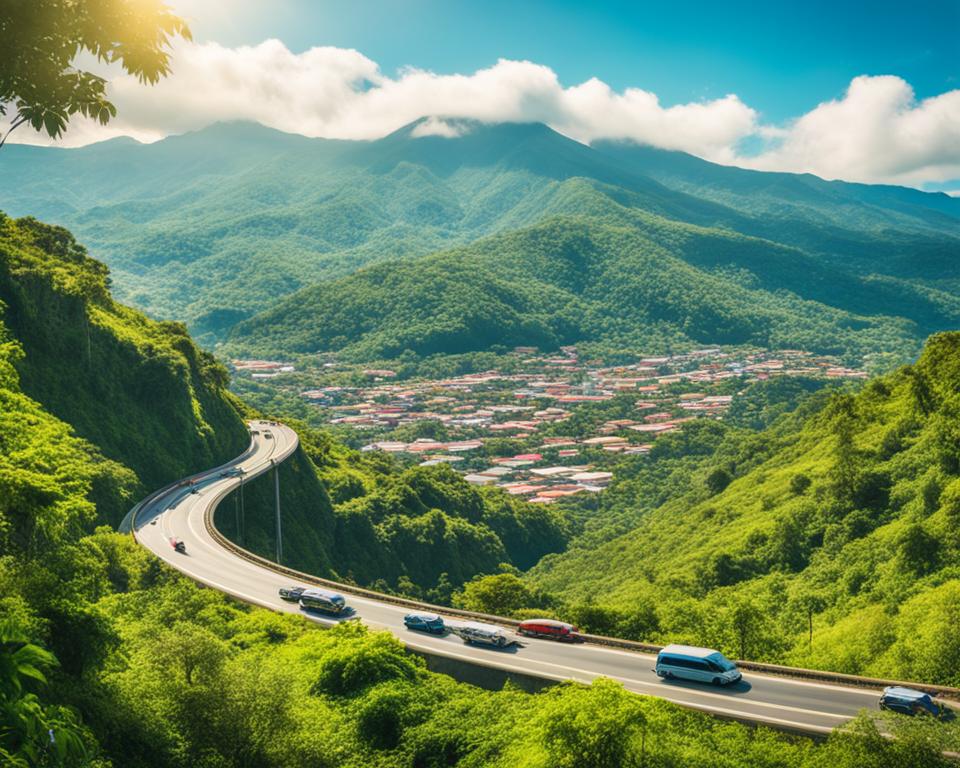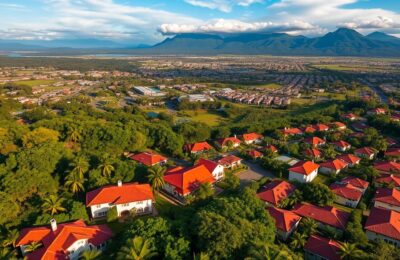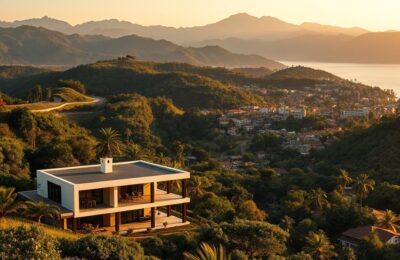Relocating to Costa Rica? What You Need to Know.
Is the dream of a laid-back life in a tropical paradise tempting you to move to Costa Rica? This Central American country is famous for its stunning nature and rich culture. It’s a top choice for people moving from different backgrounds. Knowing the basics can help you adjust better when you move.
Costa Rica is known for its stable politics and friendly locals, called Ticos. It welcomes newcomers with open arms, promising a life full of joy and beauty. This is all thanks to its “Pura Vida” motto.
Looking into Costa Rica relocation tips, you’ll find lots of useful info. This includes details on immigration, living costs, and adapting to the local way of life. Costa Rica is a top spot for retirees and is known for making people happy. But, getting used to life here means knowing what to expect.
Key Takeaways
- Costa Rica ranks among the top five countries in the International Living Retirement Index.
- Monthly living expenses vary widely, with prices ranging from $1,400 for singles to $4,000 for families.
- The digital nomad visa allows for an exciting new lifestyle, requiring a stable income of $3,000 per month.
- Understanding the local healthcare system can lead to substantial savings compared to U.S. expenses.
- Education options vary greatly, with private schools costing between $200 and $1,000 per month.
The Allure of Costa Rica: Why Relocate?
Costa Rica draws in those looking for a new home with its mix of affordable living and stunning nature. It’s known for its stable government, warm climate, and friendly people. This makes it a top spot for retirees, according to the International Living Retirement Index.
Living in Costa Rica is surprisingly affordable. You can cover your living costs with $1,400 to $1,700 a month if you’re single. Couples can get by on $2,000 to $3,000 a month. This includes housing, food, transport, and healthcare.
- Housing options include affordable properties ranging from beachfront condos to city apartments.
- Pristine beaches, lush rainforests, and majestic mountains contribute to the country’s stunning landscapes.
- Quality healthcare services are available at lower costs, supported by a robust public and private healthcare system.
The climate in Costa Rica varies by region, so you can pick the best spot for you. The tropical weather means it’s always spring-like, perfect for outdoor fun all year.
Joining the expat community in Costa Rica is a great move. You’ll find support and friends at social events. The country values education, offering top-notch schools for families.
Thinking of moving to Costa Rica? You’ll love the mix of culture, nature, and a great life quality. With its affordable homes and endless outdoor activities, it’s a dream spot in Central America.
Understanding Costa Rica’s Immigration Process
Costa Rica offers many ways for people to become residents. Knowing about the different residency options and visa needs can make moving there easier. Each residency type has its own rules that applicants must follow.
Types of Residency Options
The main residency options include:
- Pensionado: Requires a monthly income of at least $1,000 from a pension or retirement account.
- Rentista: Needs a monthly income of at least $2,500 for two years or a $60,000 bank deposit in Costa Rica.
- Inversionista: Requires a $150,000 investment in a Costa Rican business or property, thanks to new laws that support investment.
- Digital Nomad Visa: For remote workers with a stable income, allowing them to live and work in Costa Rica for longer periods.
Visa Requirements and Applications
Each residency option has its own visa requirements. It’s important to know these before applying. You’ll often need:
- Proof of income or investment.
- A criminal background check from your home country.
- A valid passport with six months left before it expires.
- Medical insurance or proof of healthcare coverage.
It’s a good idea to research the immigration process and requirements for each residency option. This can make applying smoother. For more help on preparing to move, check out this resource.
Cost of Living in Costa Rica: What to Expect
Costa Rica is a great place for expats looking for a good life. The cost of living varies based on what you want and need. You can spend between $1,400 to $3,000 a month, depending on where you live, what you do, and your lifestyle.
Monthly Budget for Expats
Setting a budget for expats means thinking about these costs:
- Rent: A one-bedroom apartment costs $700 to $1,500 in cities.
- Utilities: Electricity is about $0.12 to $0.15 per kilowatt-hour, and water is $10 a month.
- Groceries: Things like rice are $1.71 per kilo, and bananas are around $1.3 per kilo.
- Transportation: Bus fares are $1.50 to $7.00, making it a cheap way to get around.
Factors Influencing Living Expenses
Several things affect living expenses in Costa Rica, including:
- Location: Cities are pricier, especially in places tourists like to visit.
- Housing type: You can find rent for $300 in rural areas, but beachfront places cost more.
- Personal lifestyle: Eating out, having fun, and activities change based on what you like.
- Healthcare: Going to the hospital costs about $40, much less than in the US.
For more tips on budgeting and moving to Costa Rica, check out this resource.
Choosing the Best Places to Live in Costa Rica
Choosing where to live in Costa Rica is key to a great move. The country has many neighborhoods, each with its own perks for different lifestyles. Urban spots like Escazú and Atenas are great for their modern comforts and lively culture.
Escazú is close to the capital and offers easy access to shops, healthcare, and lots of food choices. It’s also a hub for expats, making it easy to meet new people. Atenas is famous for its perfect climate, making it a top choice for those who love a nice weather.

Coastal areas like Tamarindo are perfect for beach lovers, offering a relaxed vibe. The Central Valley, with cities like Heredia and Alajuela, has a cooler climate and modern amenities. It’s great for those who want a mix of nature and city life.
Every area in Costa Rica has its own unique charm, from beach towns to the peaceful Central Valley. By visiting different places, you can really feel the vibe and make a smart choice. Talking to local expats can also help a lot, offering valuable advice and support during your move.
Relocating to Costa Rica? What You Need to Know Before the Move
Thinking about moving to Costa Rica? It’s key to know the different regions before you decide. Each area has its own vibe, affecting your life in big ways. From the weather to the culture, doing your homework helps make the move smoother.
Considerations for Different Regions
Costa Rica’s regions are all unique, shaping the expat life in big ways. Here are some things to think about:
- Climate: The Central Valley has mild weather, perfect for retirees and expats. Coastal areas offer a tropical feel with more humidity, great for beach lovers.
- Amenities: Cities like San José have lots of services, including healthcare and shopping. But, rural spots offer peace and a tight-knit community life.
- Cultural Atmosphere: Knowing local customs is important. Living in a place that values “Pura vida” makes life more enjoyable, with its focus on relaxation and friendliness.
- Logistical Needs: Think about things like internet and utilities before moving. These can greatly impact your daily life in your new home.
Using these tips for moving to Costa Rica can make your experience great. Choosing the right area can make you feel more at home and comfortable. Costa Rica is a beautiful place to live, and picking the right spot can make it even better.
Healthcare in Costa Rica: A Comprehensive Overview
For expats and locals, understanding Costa Rica’s healthcare is key. The system blends public and private care, offering many options. It’s ranked 36th in the world for quality by the World Health Organization, even beating the U.S. There are about 30 CAJA hospitals and over 250 clinics, making sure everyone has access to care.
Understanding the Healthcare System
Expats can choose between the public CAJA system or private healthcare. CAJA offers affordable care to those who live here legally, with costs based on income. This means big savings, with doctor visits costing much less than in the U.S.
For those who prefer luxury, top facilities like CIMA Hospital and Clínica Bíblica are available. There are also private insurance plans for more personal healthcare choices.

Cost Comparisons with the United States
Choosing medical care in Costa Rica means big savings. A doctor’s visit costs $60 to $75, and special visits about $100. Surgeries and dental work are much cheaper here, like a knee replacement costing $12,000, not $50,000 in the U.S.
This makes Costa Rica a top spot for expats looking for quality healthcare at a lower cost. It’s also a go-to for medical tourism, offering affordable, high-quality care.
For more details on healthcare in Costa Rica, check out this guide.
Education Options for Families in Costa Rica
Families moving to Costa Rica have many education choices. The country’s schools are among the best in the world, with a literacy rate of almost 98%. Parents can pick between international schools that teach in English or local schools that immerse students in the culture and language.
International vs. Local Schools
International schools are great for expat families, offering curricula similar to their home countries. They have smaller classes and focus on each student. Local schools are free but require students to speak Spanish, making it hard for those who don’t speak the language.
- Preschool and primary education is mandatory in Costa Rica.
- The academic year runs from February to November/December.
- Public schools use a two-cycle schedule with morning and afternoon sessions.
- Costa Rican schools use both 10-point and 100-point grading systems.
Learner Support and Resources
There are many resources to help learners. Private schools offer extra help for those struggling with language. For childcare, families can find nannies or au pairs. Private preschool costs range from 200 to 800 USD a month.
For more info on moving to Costa Rica with kids, check out this useful guide.
Cultural Insights and Expat Life in Costa Rica
Living in Costa Rica means diving into its vibrant Costa Rica culture. The “Pura Vida” lifestyle is all about living simply and enjoying nature. It’s a way of life that values happiness and a positive outlook. For expats, embracing this lifestyle can make their time in Costa Rica truly special.
Embracing the “Pura Vida” Lifestyle
Expats should get to know the local community and its values. The “Pura Vida” spirit helps you feel like you belong. It’s about enjoying Costa Rica’s beauty, being active outdoors, and making friends.
Community Engagement and Activities
Costa Rica is full of community events for expats to join. These events help you meet neighbors and become part of the community. Joining in on cultural festivals, volunteering, and expat groups makes it easier to settle in.

Getting involved in local activities helps expats adjust. Learning about Costa Rica culture leads to deep friendships and a better experience. Embracing local traditions builds respect and appreciation, making life as an expat rewarding. For more tips on moving to Costa Rica, check out this guide.
Preparing for the Moving Process: Checklists and Tips
Getting ready for a move to Costa Rica is key to a smooth transition. A detailed moving to Costa Rica checklist helps keep track of everything. You’ll need to pack items suitable for the tropical climate, find temporary housing, and gather important documents. Knowing the local rules and logistics can also reduce stress.
Packing Essentials for Your Move
Choosing the right items is important when packing for Costa Rica. The climate means you’ll need clothes that are light, breathable, and fit the wet and dry seasons. Here are some must-haves for your packing list:
- Lightweight clothing (t-shirts, shorts, dresses)
- Rain gear, such as waterproof jackets and shoes
- Sun protection items, like sunscreen and hats
- Insect repellent to ward off mosquitoes
- Basic health care supplies, including medications
- Household items that are difficult to find locally
Organizing Important Documents
Staying organized is crucial during a move. Having all your important documents in order can make things easier. You’ll need:
- Birth certificates and identification cards
- Criminal records, if needed for residency
- Health insurance info and coverage details
- Housing agreements or property contracts if applicable
- Tax documents and financial records
Organizing these documents makes moving easier and helps you settle in smoothly in Costa Rica.

Transportation and Mobility in Costa Rica
Costa Rica offers many ways to get around, fitting different needs and likes. For expats moving here, knowing how to get around is crucial. You can choose from buses and shuttles for saving money or rent a car for more freedom, especially for visiting remote spots.
Options for Getting Around
Costa Rica has transport options for all budgets and travel styles:
- Public Buses: The cheapest way to travel, with prices from US$2 to $20. But, be ready for longer rides.
- Tourist Shuttles: These shared shuttles carry 10-15 people and cost about $59 to $78 per adult. Private shuttles offer more comfort, including airport pickup and stops.
- Car Rentals: A 4WD is best for exploring hidden places. Look for discounts to save money.
- Domestic Flights: Airlines like Sansa and Green Airways offer quick flights between places, taking about 30 minutes.
- Taxis and Uber: Taxis are good for short trips, and Uber is cheaper in some cities.
Transportation Tips for New Residents
Here are tips for expats getting used to Costa Rica’s transport:
- Learn the bus schedules to know where you can go.
- Be aware that during busy times like Christmas and Easter, cars might be hard to find and expensive.
- Read the rental agreement carefully, especially about insurance.
- Check if shuttles are wheelchair friendly if you need it, not all have lifts.

Conclusion
Costa Rica is a place of stunning views, deep culture, and a warm welcome for people moving from other countries. Understanding how to move there, the cost of living, and healthcare is key for newcomers. It’s known for its rich nature, making it perfect for those who love the outdoors.
The weather is great, with two main seasons, ideal for outdoor fun all year. Learning Spanish is a smart move, as it helps with making friends and getting around. Costa Rica also offers affordable homes, good healthcare, and quality schools, making it great for families and singles.
Starting a new life in Costa Rica might seem tough, but with the right prep, it can be very rewarding. You’ll love the local food and the beautiful parks full of wildlife. Living the “Pura Vida” life in Costa Rica is an adventure worth taking. For more info on living there, check out this link.
FAQ
What are the primary reasons to consider relocating to Costa Rica?
What residency options are available for expats?
What should I know about the cost of living in Costa Rica?
What are the primary reasons to consider relocating to Costa Rica?
What residency options are available for expats?
What should I know about the cost of living in Costa Rica?
FAQ
What are the primary reasons to consider relocating to Costa Rica?
Costa Rica is known for its rich culture, stunning nature, and stable politics. It’s a favorite spot for expats. The country boasts a great quality of life and the welcoming “Pura Vida” lifestyle of the locals, known as Ticos.
What residency options are available for expats?
Expats can choose from several residency types in Costa Rica. These include the Pensionado for retirees, Rentista for those with a big bank deposit, and Inversionista for investors in real estate or businesses.
What should I know about the cost of living in Costa Rica?
Living in Costa Rica is cheaper than in the U.S. Monthly costs range from
FAQ
What are the primary reasons to consider relocating to Costa Rica?
Costa Rica is known for its rich culture, stunning nature, and stable politics. It’s a favorite spot for expats. The country boasts a great quality of life and the welcoming “Pura Vida” lifestyle of the locals, known as Ticos.
What residency options are available for expats?
Expats can choose from several residency types in Costa Rica. These include the Pensionado for retirees, Rentista for those with a big bank deposit, and Inversionista for investors in real estate or businesses.
What should I know about the cost of living in Costa Rica?
Living in Costa Rica is cheaper than in the U.S. Monthly costs range from $1,400 to $3,000, depending on your lifestyle and where you live. Cities cost more than rural areas.
How can I choose the best places to live in Costa Rica?
When picking a place, think about city amenities, the climate, and being close to expat communities. Escazu is great for city life, and Tamarindo is perfect for beach lovers.
What are the healthcare options available in Costa Rica?
Costa Rica has public healthcare through the Caja system and private insurance. The care quality is high, and it’s much cheaper—40-70% less than in the U.S.
What educational options are available for families in Costa Rica?
Families can pick from international schools with English programs or local schools for cultural immersion and Spanish learning.
How can expats integrate into Costa Rican culture?
To fit in, adopt the “Pura Vida” lifestyle, connect with neighbors, and join community events. This helps expats feel part of the community.
What are some essential checklists before moving to Costa Rica?
Don’t forget important documents like birth certificates and criminal records. Pack items for the tropical climate and arrange a place to stay when you arrive.
What transportation options are available in Costa Rica?
Expats can use public buses, rent cars, take taxis, or use ride-sharing. Remember, there’s a high tax on importing cars from abroad.
What factors should I consider when preparing for my move?
It’s key to learn about the area, customs, and the logistics like internet and utilities. This helps make moving to Costa Rica smoother.
,400 to ,000, depending on your lifestyle and where you live. Cities cost more than rural areas.
How can I choose the best places to live in Costa Rica?
When picking a place, think about city amenities, the climate, and being close to expat communities. Escazu is great for city life, and Tamarindo is perfect for beach lovers.
What are the healthcare options available in Costa Rica?
Costa Rica has public healthcare through the Caja system and private insurance. The care quality is high, and it’s much cheaper—40-70% less than in the U.S.
What educational options are available for families in Costa Rica?
Families can pick from international schools with English programs or local schools for cultural immersion and Spanish learning.
How can expats integrate into Costa Rican culture?
To fit in, adopt the “Pura Vida” lifestyle, connect with neighbors, and join community events. This helps expats feel part of the community.
What are some essential checklists before moving to Costa Rica?
Don’t forget important documents like birth certificates and criminal records. Pack items for the tropical climate and arrange a place to stay when you arrive.
What transportation options are available in Costa Rica?
Expats can use public buses, rent cars, take taxis, or use ride-sharing. Remember, there’s a high tax on importing cars from abroad.
What factors should I consider when preparing for my move?
It’s key to learn about the area, customs, and the logistics like internet and utilities. This helps make moving to Costa Rica smoother.
How can I choose the best places to live in Costa Rica?
What are the healthcare options available in Costa Rica?
What educational options are available for families in Costa Rica?
How can expats integrate into Costa Rican culture?
What are some essential checklists before moving to Costa Rica?
What transportation options are available in Costa Rica?
What factors should I consider when preparing for my move?
How can I choose the best places to live in Costa Rica?
What are the healthcare options available in Costa Rica?
What educational options are available for families in Costa Rica?
How can expats integrate into Costa Rican culture?
What are some essential checklists before moving to Costa Rica?
What transportation options are available in Costa Rica?
What factors should I consider when preparing for my move?
Source Links
- https://internationalliving.com/countries/costa-rica/move/
- https://www.moving.com/tips/your-guide-to-moving-to-costa-rica/
- https://www.remax-costa-rica.com/top-10-reasons-to-move-to-costa-rica/
- https://crie.cr/why-are-so-may-people-moving-to-costa-rica/
- https://crie.cr/relocating-to-costa-rica-what-you-need-to-know-before-the-move/
- https://crie.cr/things-to-know-before-you-move-to-costa-rica/
- https://quatro.legal/relocation-to-costa-rica-how-to-immigrate-to-pura-vida-country/
- https://www.internations.org/costa-rica-expats/guide/living
- https://www.twoweeksincostarica.com/faqs-moving-to-costa-rica/
- https://senderos-cr.com/cost-of-living-in-costa-rica-2023/
- https://www.specialplacesofcostarica.com/blog/moving-to-costa-rica-comprehensive-guide-to-relocating/
- https://crie.cr/where-to-live-in-costa-rica-for-expats-and-retirees/
- https://www.liveincostarica.com/blog/choosing-where-to-live-in-costa-rica.html
- https://www.specialplacesofcostarica.com/blog/how-to-plan-your-move-to-costa-rica-7-crucial-steps/
- https://wise.com/us/blog/moving-to-costa-rica
- https://www.internationalinsurance.com/health/systems/costa-rica.php
- https://www.internations.org/costa-rica-expats/guide/healthcare
- https://crie.cr/healthcare-in-costa-rica-for-expats/
- https://www.internations.org/costa-rica-expats/guide/education
- https://crie.cr/costa-rica-schools-for-expats/
- https://www.linkedin.com/pulse/moving-costa-rica-kids-heres-what-you-need-know-rebecca-clower
- https://www.coldwellbankersamara.com/article/key-tips-for-americans-moving-to-costa-rica-what-to-know-before-you-go
- https://www.specialplacesofcostarica.com/blog/living-in-costa-rica-as-an-american/
- https://crie.cr/before-the-relocation-to-costa-rica/
- https://flamingobeachrealty.com/essential-tips-for-a-smooth-relocating-process-to-costa-rica/
- https://www.lonelyplanet.com/articles/how-to-get-around-costa-rica
- https://mytanfeet.com/costa-rica-travel-tips/how-to-get-around-costa-rica/
- https://senderos-cr.com/moving-to-costa-rica/
- https://www.remax-costa-rica.com/moving-to-costa-rica-guide-from-dream-to-reality/
- https://www.coastalrealtycostarica.com/the-gold-coast-blog/costa-rica-living-conditions-what-to-expect-before-you-move




